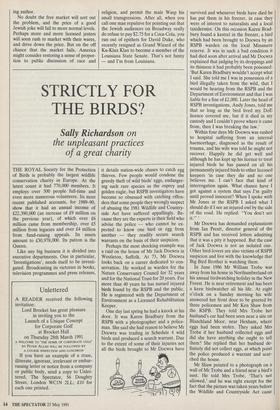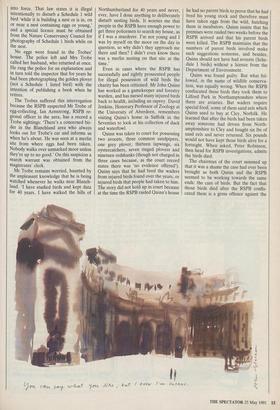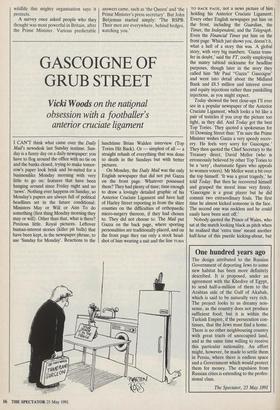STRICTLY FOR THE BIRDS?
Sally Richardson on
the unpleasant practices of a great charity
THE ROYAL Society for the Protection of Birds is probably the largest wildlife conservation charity in Europe. At the latest count it had 770,000 members. It employs over 500 people full-time and even more numerous volunteers. Its most recent published accounts, for 1989-90, show that it had an annual income of £22,390,000 (an increase of £9 million on the previous year), of which over £6 million came from membership, over £5 million from legacies and over £4 million from fund-raising appeals. Its assets amount to £30,978,000. Its patron is the Queen.
Like any big business it is divided into executive departments. One in particular, `Investigations', needs itself to be investi- gated. Broadcasting its victories in books, television programmes and press releases, it details nation-wide chases to catch egg thieves. Few people would condone the greedy theft of wild birds' eggs, endanger- ing such rare species as the osprey and golden eagle, but RSPB investigators have become so obsessed with catching offen- ders that some people they wrongly suspect of abusing the 1981 Wildlife and Country- side Act have suffered appallingly. Be- cause they are the experts in their field who advise the police — who cannot be ex- pected to know one bird or egg from another — they readily secure search warrants on the basis of their suspicion.
Perhaps the most shocking example was a raid on the house of Mr Jack Docwra in Westleton, Suffolk. At 73, Mr Docwra looks back on a career dedicated to con- servation. He worked as warden for the Nature Conservancy Council for 32 years and for the National Trust for 20 years. For more than 40 years he has nursed injured birds found by the RSPB and the public. He is registered with the Department of Environment as a Licensed Rehabilitation Keeper.
One day last spring he had a knock at his door. It was Karen Bradbury from the RSPB with a photographer and a police- man. She said she had reason to believe Mr Docwra was trading in Schedule 4 wild birds and produced a search warrant. Due to the extent of some of their injuries not all the birds brought to Mr Docwra have
survived and whenever birds have died he has put them in his freezer, in case they were of interest to naturalists and a local taxidermist. On this occasion Karen Brad- bury found a kestrel in the freezer, a bird which had been brought to Docwra by an RSPB warden on the local Minsmere reserve. It was in such a bad condition it had died soon after arrival and Mr Docwra explained that judging by its droppings and its thinness it had probably been poisoned: `But Karen Bradbury wouldn't accept what I said. She told me I was in possession of a bird illegally taken from the wild, that I would be hearing from the RSPB and the Department of Environment and that I was liable for a fine of £2,000. Later the head of RSPB investigations, Andy Jones, told me that so long as the bird lived my DoE licence covered me, but if it died in my custody and I couldn't prove where it came from, then I was breaking the law.'
Within four days Mr Docwra was rushed to hospital suffering from an internal haemorrhage, diagnosed as the result of trauma, and his wife was told he might not recover. Happily he did get well and although he has kept up his licence to treat injured birds he has passed on all his permanently injured birds to other licensed keepers 'in case they die and no one believes me. I can't face that kind of interrogation again. What chance have I got against a system that says I'm guilty until proved innocent? When I spoke with Mr Jones at the RSPB I asked what I should do if I see an injured owl by the side of the road. He replied: "You don't see it." ' Mr Docwra has demanded explanations from Ian Prestt, director general of the RSPB and has received letters admitting that it was a pity it happened. But the case of Jack Docwra is not an isolated one. Other bird-lovers are also victims of RSPB suspicion and live with the knowledge that Big Bird Brother is watching them.
In June 1986 Mr William Trobe was away from his home in Northumberland on his annual birdwatching holiday in the New Forest. He is near retirement and has been a keen birdwatcher all his life. At eight o'clock on a Sunday morning his wife answered her front door to be greeted by three policemen and Mr Ken Shaw from the RSPB. They told Mrs Trobe her husband's car had been seen near a site on Blanchland Moor, near Hexham, where eggs had been stolen. They asked Mrs Trobe if her husband collected eggs and did she have anything she ought to tell them? She replied that her husband de- finitely did not collect eggs, at which point the police produced a warrant and sear- ched the house.
Mr Shaw pointed to a photograph on a wall of Mr Trobe and a friend near a bird's nest. He told Mrs Trobe, 'That's not allowed,' and he was right except for the fact that the picture was taken years before the Wildlife and Countryside Act came into force. That law states it is illegal intentionally to disturb a Schedule 1 wild bird 'while it is building a nest or is in, on or near a nest containing eggs or young,' and a special licence must be obtained from the Nature Conservancy Council for photography of Schedule 1 birds while on the nest.
No eggs were found in the Trobes' house. The police left and Mrs Trobe called her husband, who returned at once. He rang the police for an explanation and in turn told the inspector that for years he had been photographing the golden plover (not a Schedule 1 listed bird) with the intention of publishing a book when he retires.
The Trobes suffered this interrogation because the RSPB suspected Mr Trobe of egg-collecting. Ian Armstrong, RSPB re- gional officer in the area, has a record a Trobe sightings: 'There's a concerned bir- der in the Blanchland area who always looks out for Trobe's car and informs us when he's about. He was seen at a merlin site from where eggs had been taken. Nobody walks over unmarked moor unless they're up to no good.' On this suspicion a search warrant was obtained from the magistrates' clerk.
Mr Trobe remains worried, haunted by the unpleasant knowledge that he is being watched whenever he walks near Blanch- land. 'I have studied birds and kept data for 40 years. I have walked the hills of Northumberland for 40 years and never, ever, have I done anything to deliberately disturb nesting birds. It worries me that people in the RSPB have enough power to get three policemen to search my house, as if I was a murderer. I'm not young and I was by myself on the moor on the day in question, so why didn't they approach me there and then? I didn't even know there was a merlin nesting on that site at the time.'
Even in cases where the RSPB has successfully and rightly prosecuted people for illegal possession of wild birds the charity has been criticised. Mr John Quinn has worked as a gamekeeper and forestry warden, and has nursed many injured birds back to health, including an osprey. David Jenkins, Honorary Professor of Zoology at the University of Aberdeen, remembers visiting Quinn's home in Suffolk in the. Seventies to look at his collection of duck and waterfowl.
Quinn was taken to court for possessing two avocets, three common sandpipers, one grey plover, thirteen lapwings, six oystercatchers, seven ringed plovers and nineteen redshanks (though not charged in three cases because, as the court record states there was 'no evidence offered'). Quinn says that he had bred the waders from injured birds found over the years, or injured birds that people had taken to him. The story did not hold up in court because at the time the RSPB raided Quinn's house he had no parent birds to prove that he had bred his young stock and therefore must have taken eggs from the wild, hatching them in incubators. Quinn insists that his premises were raided two weeks before the RSPB arrived and that his parent birds were killed. The RSPB maintains that the numbers of parent birds involved make such suggestions nonsense, and besides, Quinn should not have had avocets (Sche- dule 1 birds) without a licence from the Department of Environment.
Quinn was found guilty. But what fol- lowed, in the name of wildlife conserva- tion, was equally wrong. When the RSPB confiscated these birds they took them to Lilford Park in Northamptonshire where there are aviaries. But waders require special food, some of them sand eels which Quinn used to buy at Cley, Norfolk. He learned that after the birds had been taken away someone had driven from North- amptonshire to Cley and bought six lbs of sand eels and never returned. Six pounds would not have kept those birds alive for a fortnight. When asked, Peter Robinson, then head for RSPB investigations, admits the birds died.
The chairman of the court summed up that it was a shame the case had ever been brought as both Quinn and the RSPB seemed to be working towards the same ends: the care of birds. But the fact that those birds died after the RSPB confis- cated them is a gross offence against the wildlife this mighty organisation says it protects.
A survey once asked people who they thought was most powerful in Britain, after the Prime Minister. Various predictable answers came, such as 'the Queen' and 'the Prime Minister's press secretary'. But John Betjeman started simply: 'The RSPB. Their men are everywhere, behind hedges, watching you.'




















































 Previous page
Previous page